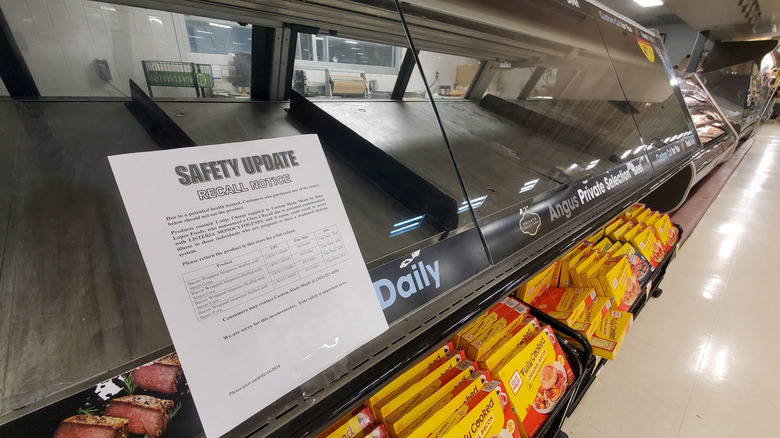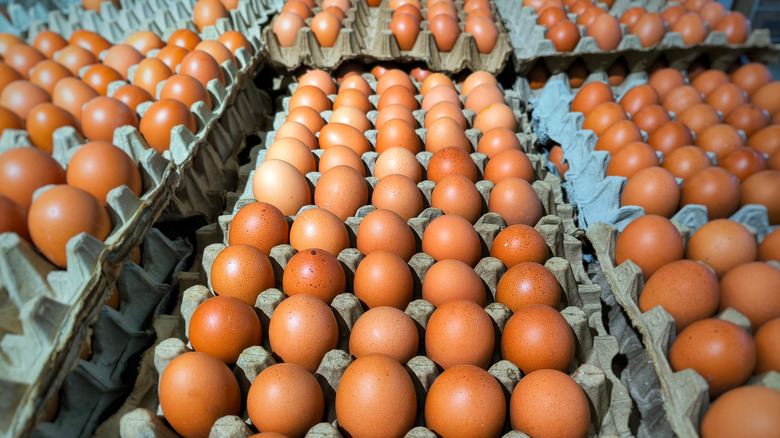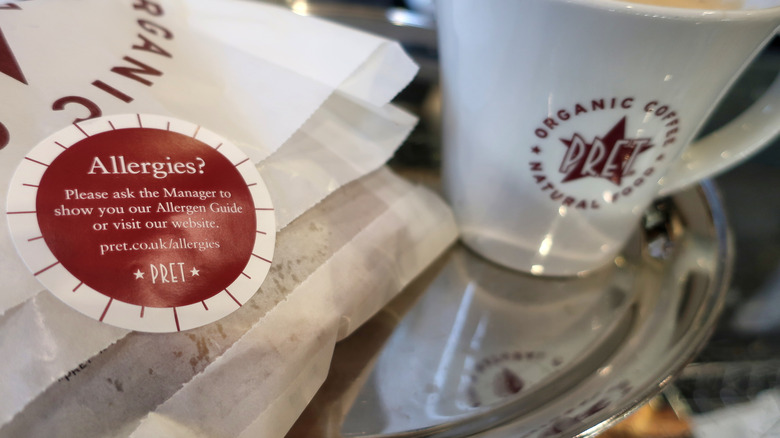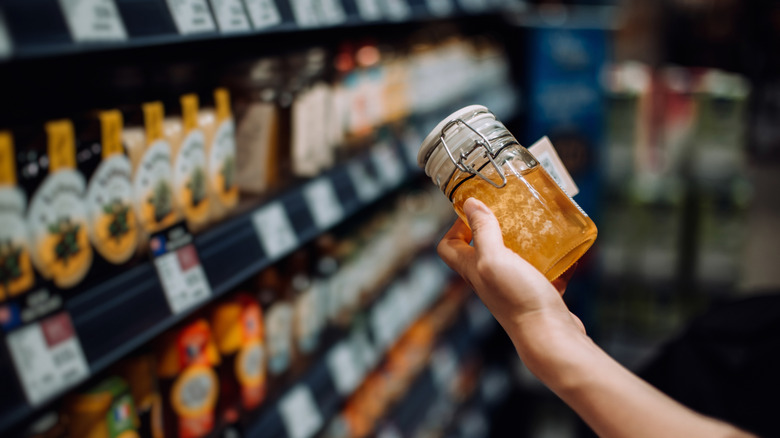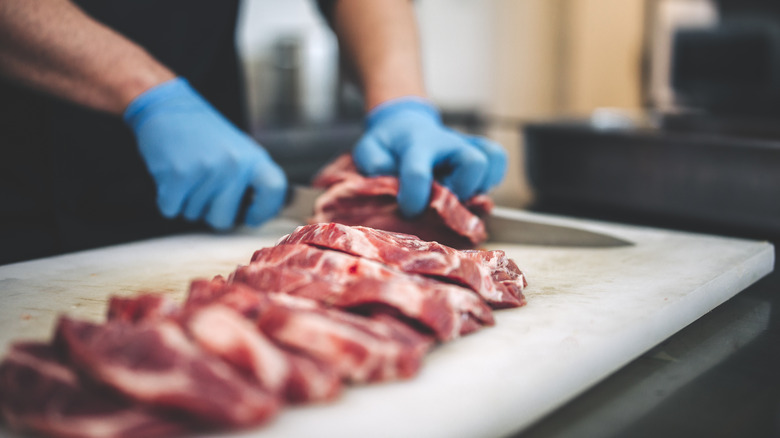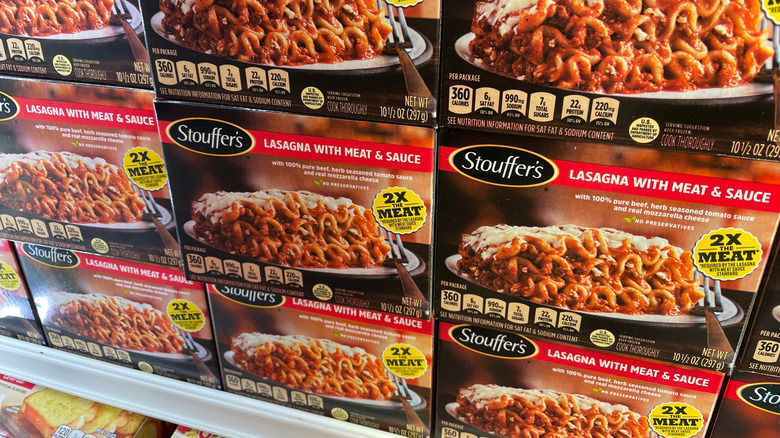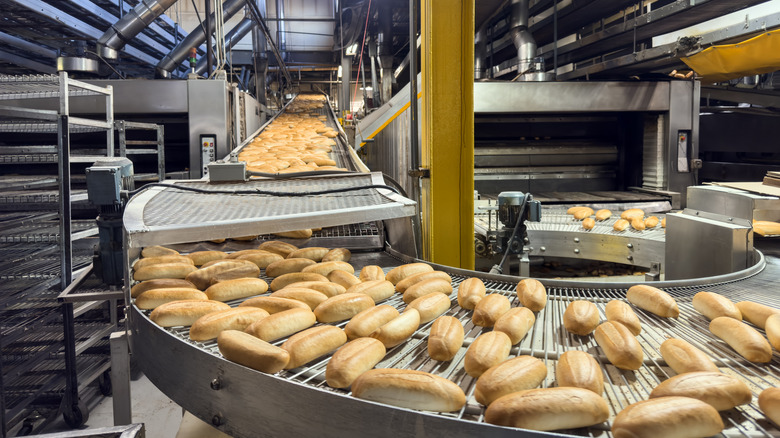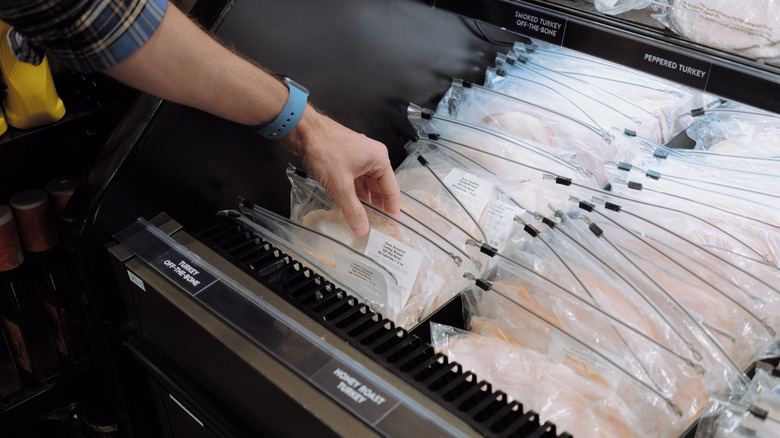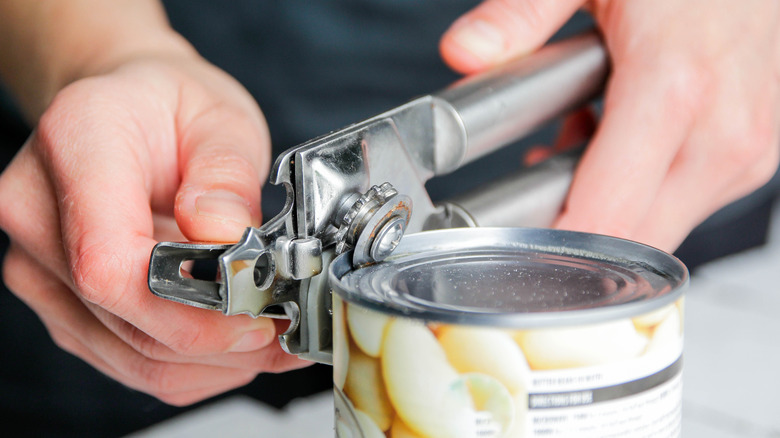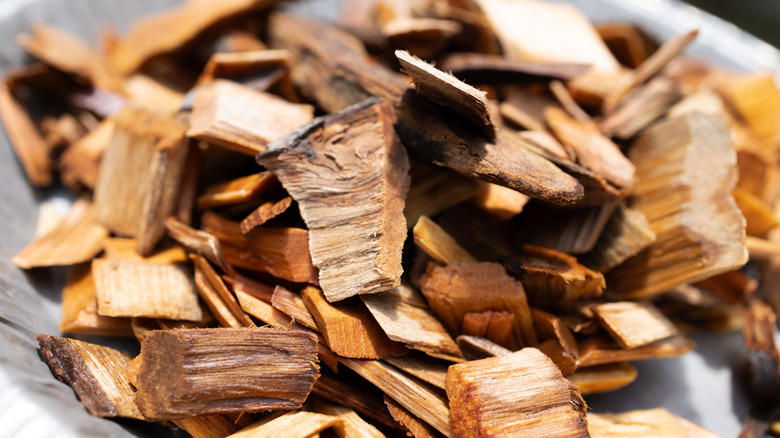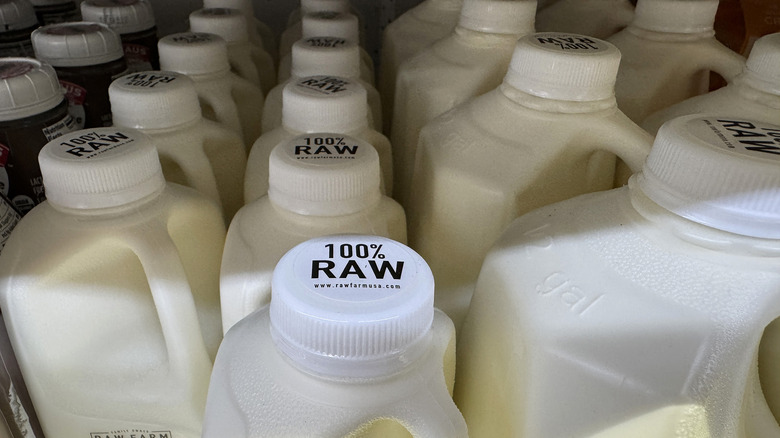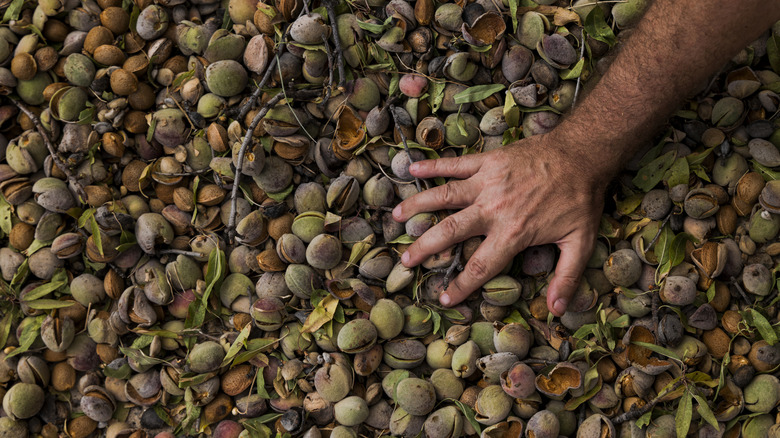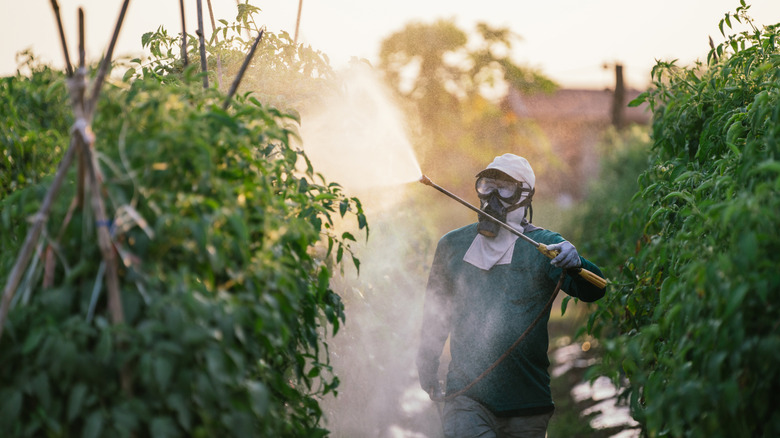The 13 Most Common Reasons Foods Are Recalled
Food recalls seem to be in the headlines nearly every day recently. It is not just in your imagination, though. Food recalls really have been on the rise, with recalls rising by 20% between 2020 and 2023, (via Northeastern Global News). There are multiple reasons for this, including organizational shifts at the Food and Drug Administration (FDA), and lingering ramifications from the COVID-19 pandemic and all the labor force and manufacturing problems that came with it, among them. Recalls originate several different ways, for a variety of reasons; the FDA may enforce a recall, or a company may voluntarily recall items due to an issue it noticed on its end.
When you think of a food recall, though, you may think that foods are generally just recalled due to a risk of food poisoning, should you eat the recalled food. However, there are many, many more reasons why a food item might be recalled, and some of the most common reasons for a recall might just shock you — or at least make you pay more attention to those recalls and closely compare them against the food in your fridge or pantry in the future.
Salmonella outbreaks
Salmonella is a pretty familiar source of food-borne illness and it is one of the most common sources of food-borne illness, with millions of people contracting it every year in the United States, from a variety of foods, including eggs, chicken, packaged meats, butter, oatmeal, seafood, produce, and more. You can typically avoid salmonella — and the gastrointestinal distress that comes with it — by washing your hands well and cooking food until it is completely done, but other times you can't as easily dodge it. Sometimes, food you might not think to cook, like produce, is contaminated (as was the case in 2024 when Trader Joe's issued a recall on green onions). Worst yet, once you get it, salmonella is contagious.
Some of the worst salmonella outbreaks? In 2009, more than 700 people became ill and nine people died after eating contaminated peanut butter. In 2015, more than 900 people became ill and one person died from eating contaminated cucumbers. Even as recently as 2025, a cucumber-related outbreak caused more than a hundred cases of hospitalization over 23 states.
Undisclosed allergens
It may not seem like a big deal — after all, most people will still be able to eat food that has been recalled due to undisclosed allergens and suffer absolutely no negative effects — but for those with a food allergy, an undisclosed allergen can cause severe illness or even death. The most common undeclared allergens are wheat, shellfish, eggs, fish, peanuts, milk, tree nuts, sesame, and soybeans, and these allergens impact approximately 90% of the people with food allergies. Often, when a food is recalled due to an undisclosed allergen, it is not because the company is necessarily trying to hide an ingredient; instead, there is usually an issue with the packaging, or there was some cross-contamination somewhere down the line.
Just about any type of food might be recalled due to undisclosed allergens. In 2019, Perdue Foods recalled 500 pounds of chicken due to undeclared allergens. In 2024, Lay's recalled potato chips in two states due to undeclared dairy (no, the chips do not normally contain any dairy, and this was an instance of contamination). In April 2024, a manufacturer recalled nearly 500,000 pounds of breakfast sandwiches due to undeclared sesame.
Broken glass
One of the very last things you want to find when you bite into your food is broken glass — and yet broken glass appears fairly often among food-related recalls. It was one of the reasons that Starbucks recalled its bottled Frappuccino beverages in 2023. More recently, in April 2025, Upper Crust Bakery recalled nearly a thousand cases of bread that had been distributed across six states due to glass fragments being found on top of the bread.
How does something so potentially dangerous end up in your food, especially when it's something that really shouldn't be near your food at all? There are a few ways that broken glass can make its way into a packaged food product. During manufacturing, glass containers or equipment can break without the manufacturer realizing it, leading to the food continuing its way through the production line. Glass packaging can likewise be damaged during transport, leading to contamination. The foods most likely to be recalled for broken glass include, of course, food packaged in glass, but also canned foods, as glass equipment may be used in the manufacturing process.
E. coli contamination
Like salmonella, E. coli is a pretty common source of food-borne illness, with more than a quarter of a million infections reported in the United States annually, per the Cleveland Clinic. Also like salmonella, E. coli is contagious and can cause gastrointestinal distress. Typically, the foods responsible for an infection include undercooked meat and unwashed produce.
While E. coli is not typically deadly, there have been some E. coli-related food recalls that have coincided with unfortunate deaths. In the early 1990s, contaminated Jack in the Box hamburgers made about a hundred people sick, and killed four. In 2006, contaminated Dole baby spinach caused more than 200 illnesses and three deaths. More recently, in 2024, a carrot-related E. coli outbreak killed at least one person. E. coli has been responsible for some seriously huge ground beef recalls, as well as vegetable recalls.
While you can find E. coli in undercooked meats, you shouldn't cook contaminated meat to kill the E. coli, as you have to be extremely sure that the meat reaches an internal temperature of 160 F. When E. coli can potentially kill you, that is not a risk you will want to take, even if you have a cooking thermometer on hand.
The wrong product in the package
In some cases, manufacturers accidentally put the wrong food in the package, or the wrong label is put on a food item. Whatever the case may be, an unassuming shopper is not getting what they asked for. Not only can this be an annoyance, but it can also prove a health risk. If the correct label or packaging is not used, then there is no way for the consumer to know what the food actually contains — meaning that the food could contain a potentially dangerous allergen. As such, when the wrong product goes out in the wrong package, food brands must issue a recall rather than just saying "oops!"
Sometimes, the two mixed-up food items are relatively similar, as was the case when Aprons accidentally put a label for a ready-to-cook chicken cordon bleu meal onto a bacon cheddar-smothered chicken with broccoli meal, or when Nestle issued a recall for Lean Cuisine frozen fettuccine Alfredo meals because the boxes actually contained chicken fettuccine (a very slight but noticeable difference). Other times, though, the foods are very different, as was the case when Nestle recalled Stouffer's frozen lasagnas, because the boxes contained stuffed peppers, not lasagna.
Metal shards
Just like glass is not something you really want to find in your food, you also probably would not be too pleased if you bit down into a piece of misplaced metal. Another contaminant that sometimes ends up in food due to manufacturing issues, metal shards pop up as a reason for a recall relatively frequently.
In 2019, Tyson issued a huge recall, impacting about 12 million pounds of chicken strips, after consumers reported finding metal in the chicken. Some even reported injuries. In 2024, MadeGood granola bars were recalled due to the potential for metal to be found in a few flavors of the granola bars. Also in 2024, Perdue recalled more than 167,000 pounds of frozen chicken due to, not metal shards, but — close enough — pieces of metal wire. Even more recently, in 2025, Aldi issued a recall for some taquitos, citing metal found in the product, with one consumer reporting a dental injury. Metal shards have also spurred ground beef recalls, as well as coffee recalls.
Listeria contamination
Listeria is a greater risk for some than others. While those at the peak of health are unlikely to become ill from eating listeria-contaminated food, the bacteria, which survives even the coldest temps, can prove fatal for pregnant individuals, infants, the elderly, and those with weakened immune systems. Unfortunately, it can often be difficult to pinpoint what food caused a listeria infection, as symptoms can begin as much as a month after eating a contaminated food. While an infection starts with the typical gastrointestinal stress, it can then spread to your nervous system.
Foods most likely to cause a listeria infection include raw vegetables, meat, dairy, and highly processed meats, like deli meat or hot dogs. Over the decades, there have been several seriously deadly listeria outbreaks, with recalled cheese killing nearly 30 in 1985, recalled cantaloupes killing more than 30 in 2011, recalled hot dogs killing more than a dozen in the late 1990s, and recalled turkey killing seven in 2002. Most recently, while not yet a deadly case, listeria-contaminated celery was recalled from Walmart in April 2025, across nearly 30 states.
Pieces of plastic
Plastic has caused a variety of recalls in recent history. In 2024 alone, Connie's recalled thin crust cheese pizzas, Walmart recalled cheese danishes and cinnamon rolls, Costco recalled Kodiak waffles and Tillamook cheese, Trader Joe's recalled chicken soup dumplings, and Annie's recalled macaroni and cheese, all due to plastic contamination. Looking into late 2023, TGI Friday's and Banquet likewise issued plastic-related recalls. More recently, in 2025, Coca-Cola recalled 10,000 cans of soda, Grain Millers recalled rolled oats, and Johnsonville recalled more than 22,000 pounds of cheddar bratwursts, all due to plastic. Plastic-related recalls have likewise impacted Sam's Club, Snickers, Starbucks, and Subway in the past.
In other words, it is really not all that uncommon to find plastic pieces where they should not be while you are eating. In many instances, consumers realize they are eating a piece of plastic before they actually ingest it, but if you do eat plastic, it can cause serious issues, such as major gastrointestinal issues as your body tries to pass the plastic, allergic reactions, and even toxicity.
Botulism toxins
Botulism doesn't come directly from a bacteria, like E. coli or salmonella. Instead, botulism is an illness caused by a toxin produced by a bacteria, clostridium botulinum. The bacteria itself is generally safe for consumption, but, under the perfect circumstances, the bacteria produces a toxin that is incredibly lethal. Unfortunately, some manufactured foods — particularly canned foods — produce just the right environment for the toxin to thrive, and it is not just gastrointestinal distress that comes with botulism. Other symptoms include muscle weakness, difficulty seeing, difficulty talking, and difficulty breathing, which can eventually lead to death.
Luckily, botulism outbreaks related to food recalls are rarer than salmonella, E. coli, or listeria-related outbreaks. Still, they do happen. In 2024, a mayonnaise recall in Saudi Arabia left 75 individuals hospitalized and one dead. In 2021, Costco recalled black beans that could have potentially caused botulism, due to a compromised seal. In March 2025, a range of prepared mixed vegetables served under multiple brands were recalled in California due to botulism risk.
Bits of wood
At least if you bit into a piece of wood while eating, it might not hurt quite as much as chowing down on a piece of glass or metal? Maybe? However, it is still not something you want in your food, even if you find a way to look at the potentially bright side. It is not uncommon at all for wood to make its way into various items across the grocery store, and automation could be one reason why there is an uptick in food recalls related to wood and similar foreign materials.
In April 2025, a recall was issued for more than a dozen frozen soup and bowl items, including Campbell's Chicken Tortilla Soup, Campbell's Wicked Thai Soup, and Campbell's Soup Baha Chicken Enchilada Soup. In March 2025, Nestle recalled Lean Cuisine and Stouffer's frozen meals, including Lean Cuisine Butternut Squash Ravioli, Lean Cuisine Spinach Artichoke Ravioli, Lean Cuisine Lemon Garlic Shrimp Stir Fry, and Stouffer's Party Size Chicken Lasagna, due to the discovery of a "wood-like material" in the products. Nestle has recalled other products in the past due to potential wood contamination, including recalling Toll House chocolate chip cookie dough bars. In 2019, Perdue had recalled its gluten-free chicken nuggets due to potential wood contamination, and other chicken and beef products have been historically affected, as well.
Campylobacter bacteria
You might not be as familiar with this bacteria as you are E. coli or salmonella, but it is very likely that you may have fallen prey to the bacteria's food-borne illness in the past. About 1.5 million Americans become sick due to campylobacter bacteria each year. The bacteria causes gastrointestinal distress and common food sources include raw or undercooked meat, dairy, and produce.
In 2024, the FDA issued a warning for restaurants and retailers to not serve or sell potentially campylobacter-contaminated oysters that had been distributed throughout more than a dozen states. In late 2024, bottled raw milk was recalled in Connecticut due to campylobacter infections, which caused at least two people to seek health care. Another raw milk recall occurred in Utah in 2014, in connection with campylobacter bacteria; in this instance, the bacteria sickened nearly 100 people, hospitalized 10, and killed one. In 2013 to 2014, an Oregon restaurant was using undercooked chicken liver to prepare pate, and that resulted in a government-recognized campylobacter outbreak, if not a recall.
Small rocks
Whereas glass or metal might make their way into your food during the manufacturing process, sometimes rocks start out mixed in with your food naturally, and then they are just never removed before the food makes its way to the store. For example, when almonds are harvested, they are scooped up from the ground, so it wouldn't be surprising if a rock gets mixed in with the almonds at that point. While the almonds go through a separation process, rocks can still avoid detection and end up in a final product.
This was the case in April 2025 when Tony's Chocolonely chocolate bars were recalled due to the presence of "small stones." Likewise, in 2024, Trader Joe's chicken pilaf was recalled due to potential rock contamination (and, in this case, one consumer reported a dental injury related to eating the pilaf). Trader Joe's has actually needed to recall several products due to rock contamination in recent history, including the chain's almond windmill cookies and cooked falafel.
Pesticide residue
Unless you are eating an all-organic diet, then it is just a given that pesticides were likely used on your food at some point in the chain of production. However, occasionally, the pesticides end up actually in your food. This was the case in 2024, when nearly a million bags of tea were recalled due to high amounts of pesticide residue. The tea in question was East West Tea Company's Organic Yogi Echinacea Immune Support tea and, while the brand said at the time that it does not use pesticides, it admitted that it is not out of the question that its ingredients could be exposed to pesticides at some point in time. It was determined that the tea did not pose a health risk to consumers, but the recall was necessary for quality concerns.
Sometimes, though, unfortunately, food laced with pesticides isn't recalled at all. For example, one research study found that the pesticide Chlormequat could be detected in oats-based foods like Cheerios and Quaker Oats, but there was no associated recall.
